The Cananga tree has a golden, star-shaped bloom known as ylang-ylang (Cananga odorata). The Indian Ocean country’s neighbouring nations, including India, the Philippines, Malaysia, Indonesia, and a few parts of Australia, are home to this tropical species. In this article we will examine the ylang-ylang essential oil benefits as well as its uses and side effects.
Fruity, floral, and rich describe the fragrant, aromatic perfume of ylang-ylang.
By using steam distillation, the ylang-ylang flower is utilised to create a variety of essential oils. The most potent essential oil made from the ylang-ylang flower is called Ylang Ylang Extra. This oil is frequently used in cosmetics and fragrances.
Cananga oil is a common name for ylang-ylang’s most subdued kind. A traditional cure for boosting sexual desire and lowering sexual anxiety is ylang-ylang.
According to tradition, people have been using ylang-ylang as a remedy to treat many conditions such as:
- Boosts mood
- Minimises depression
- Relieves anxiety
- Reduces blood pressure
- Lessens heart rate
- Acts as an insect repellent
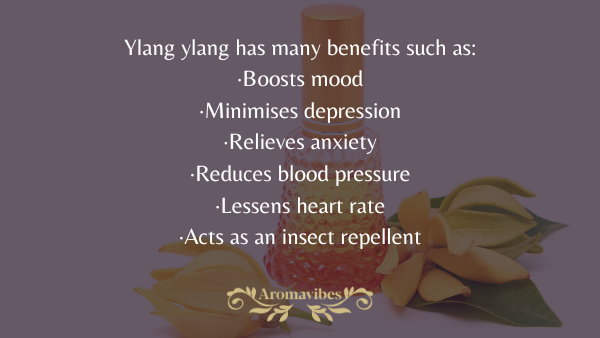
Ylang-Ylang Essential Oil Benefits
1. Reduces Anxiety
A published study found that applying ylang-ylang essential oil to the skin or inhaling it reduced anxiety and increased self-esteem. Ylang-ylang has a beneficial effect on mood according to many studies.
2. Antibacterial Activity
Linalool, a compound found in ylang-ylang, has antibacterial, antifungal, and anti-inflammatory properties. This oil is effective in the treatment of Candida albicans, a fungal infection. However, more research needs to fully understand the antimicrobial properties of ylang-ylang essential oil.
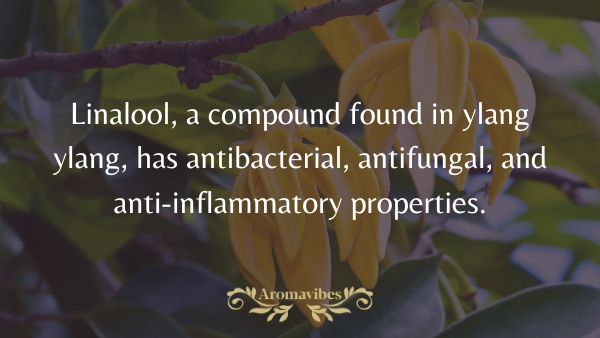
3. Reduces Blood Pressure
When absorbed through the skin, ylang-ylang essential oil may assist with blood pressure reduction.
In addition, other ylang-ylang essential oil benefits is that it may aid in the treatment of hypertension. An experiment group that inhaled a blend of essential oils containing lavender, ylang-ylang, marjoram, and neroli reported lower levels of stress and blood pressure.
Another study discovered that the aroma of ylang-ylang essential oil lowered both systolic and diastolic blood pressure levels.
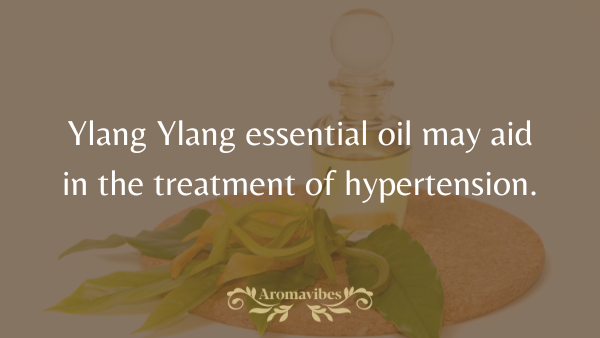
4. Anti-inflammatory Properties
Isoeugenol, a substance identified for its anti-inflammatory properties, is found in ylang-ylang essential oil.
The compound may also aid in the decrease in oxidative stress. This procedure may eventually minimise the likelihood of long-term diseases like cancer and cardiovascular problems.
5. Helps in Wound Healing
Essential oils, including ylang-ylang, have anti-proliferative properties, according to research on skin fibroblast cells. The essential oil had tissue remodelling effect and wound-healing properties, according to studies.
6. Potential Anti-Malarial Effect
Several studies have supported the long-established use of ylang-ylang in the treatment of malaria. A Vietnamese research team discovered that the oil has anti-malarial activity.
However, more research is needed to determine the importance of ylang-ylang as an additional malaria treatment.
7. Supports Skin Health
Ylang-ylang has been used in skin care to treat acne. It has been demonstrated that it can inhibit the activity of the bacteria that causes acne.
Also, it is claimed to have a moisturising effect on dry skin and enhance the renewal of skin cells. The oil may also help to smooth out fine lines and wrinkles. Aromatherapy may assist with maintaining a healthy scalp. It has the potential to revitalise the scalp and reduce hair fall. The oil was traditionally used for its anti-sebum properties. However, no research has been conducted to support this claim.
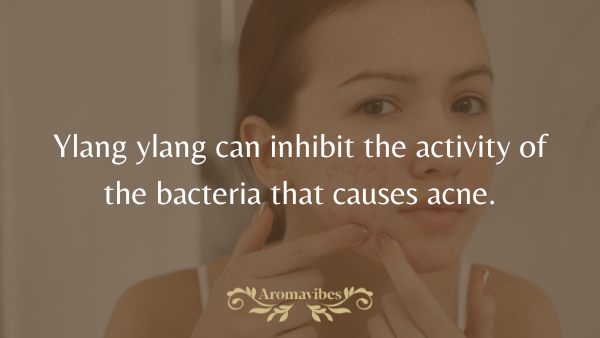
Does Ylang-Ylang Work as an Insect Repellent?
Ylang-ylang oil can acts as a natural mosquito repellent. It kills mosquitos while being safe for humans and the environment. According to a research study, when diluting ylang-ylang essential oil with coconut oil, it can provide 98.9% protection against the Aedes aegypti mosquito bites for up to 88.7 minutes.
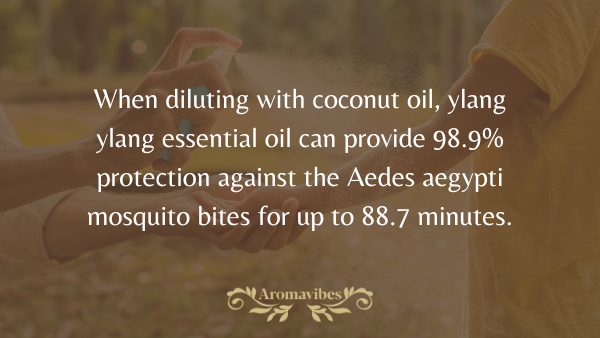
How to Use Ylang-Ylang
Most essential oils are highly potent. As a result, diluting them with carrier oils (such as jojoba or coconut oils) before applying them topically is essential. Also to test for sensitivity, you can perform a patch test by applying the essential oil to a small area.
When you combine it with a carrier oil, you can be use it for dry skin care and massage. You can also apply it to the scalp to stimulate oil production and relieve dryness. To apply it topically, combine one drop of essential oil with one teaspoon of carrier oil. Additionally, you can use ylang-ylang as an aromatherapy treatment by diffusing it in a room.
Because ylang-ylang has a lengthy shelf life, you can make many parcels and store them for a year or more.
Side Effects of Ylang-Ylang Essential Oil
According to case studies, ylang-ylang essential oil may cause skin irritation in some participants. Also, it has the possibility of triggering skin irritation and contact dermatitis for some people.
Additionally, isoeugenol is found in ylang-ylang oil and contact allergens have been identified for this compound.
Final Thoughts
Ylang-ylang has several scientifically proven benefits, including anxiety relief and blood pressure reduction in some people.
Because ylang-ylang contains many allergens, you should use it with caution on the skin.
You can read more about ylang-ylang essential oil benefits on Healthline, Dottera and on WebMD. You can also check Aromavibes for a wide collection of essential oils!

